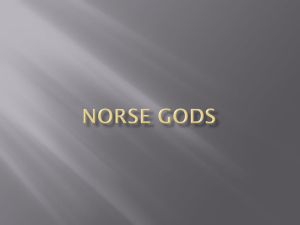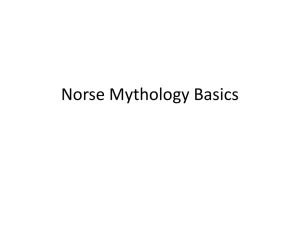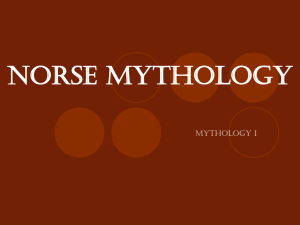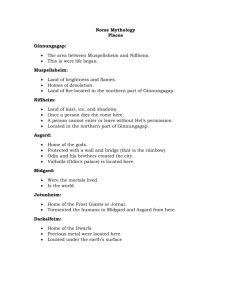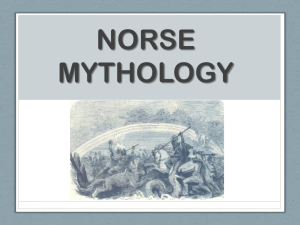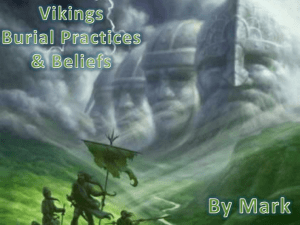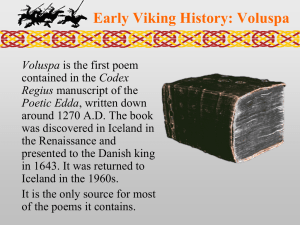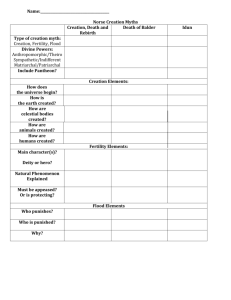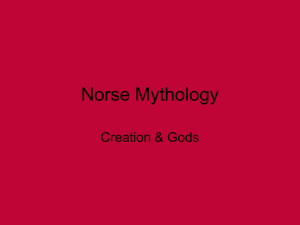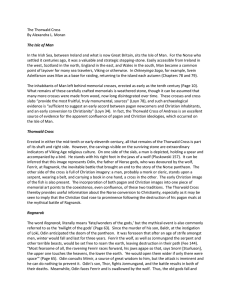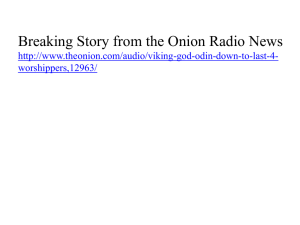2013-OE Lit--Pt 4 Norse
advertisement
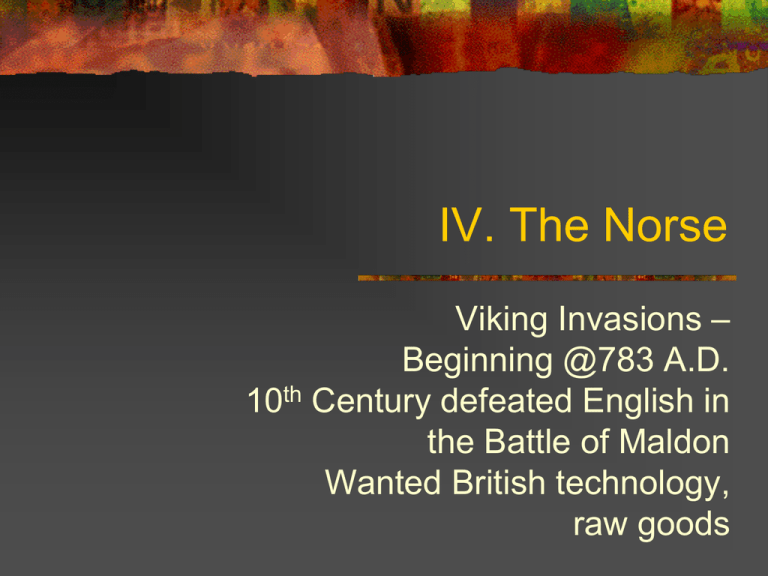
IV. The Norse Viking Invasions – Beginning @783 A.D. 10th Century defeated English in the Battle of Maldon Wanted British technology, raw goods From The Anglo-Saxon Chronicles —Attack on Lindesfarne Monastary “A.D. 793 This year came dreadful forewarnings over the land of the Northumbrians, terrifying the people most woefully; these were immense sheets of light rushing through the air. . . and fiery dragons flying across the firmament. These tremendous tokens were soon followed by a great famine, and . . . in the same year, the harrowing inroads of heathen men made lamentable havoc in the church of God in Holy-island, by rapine and slaughter…” Lindesfarne Lindesfarne Castle The Castle, on the seashore, would have been hard to conquer, but Vikings attacked the coast almost annually. Lindesfarne Monastery The monastery lies in ruins as a result of Henry VIII’s dissolution of the monasteries And now for something completely different. . . They were ruthless—imagine attacking monks and nuns!—but they gave us the wild and wacky world of Norse Mythology—which will help us understand the events in Beowulf. Norse Mythology—The Creation Adumla (cow) | Buri | Bor—Bestla (frost giant’s daughter) | (w)odin—----Vili—----Ve (spirit of life) (wits & heart) (hearing & sight) The Norse Flood Story Odin and his brothers Vili and Ve killed all the frost giants but one—and all the blood flooded the world When the floodwaters receded, they took two branches and made them into the first people, Ask (ash) and Embla (elm or vine) Norse Cosmology Midgard Middle earth, enclosure away from stone giants Asgard (Settled by Odin, Vili, Ve – the Aesir, guardians of men) linked to midgard by the flaming rainbow bridge, Bifrost Cultural Connection: Dwarves held up the corners of Middle Earth: Translated, their names mean North, South, East, and West Cultural Connection: The Days of the Week Sunday Monday Tuesday (Tiu—warrior god, symbol=boar) Wednesday (Wodin) Thursday (Thor—thunder god, very popular) Friday (Freya—fertility god) Connecting the worlds- Yggdrasil –The living tree, the suffering tree, the life-giver Regenerates itself, eternal (was, and is, and will be) Ratatosk Nibbles roots of Yggdrasil Carries insults and gossip between the dragon Nidhogg and an eagle in the top branches Original Runes- “FUTHORK” I. Asgard Well of Urd. Three Norns have a hall beside the well (Wyrd/Urd), Verdandi, Skuld) (equivalent of the fates) Alfheim – home of the elves, or bright elves. Valhalla – hall of the slain warriors (Einheriar), half chosen by Odin, others to Freja Vigrid – a vast plain, stretching 120 leagues in every direction, site of Ragnarok. Odin—The All Father with his ravens Thought & Memory Odin with his 8 legged horse Slepnir—remind you of anyone? An older image in stone Significance of trees Odin hung on a tree for nine days to gain two boons for mankind – Runes (magical alphabet) and Skaldic Mead (poetic inspiration) II. Midgard Midgard is the home of men (literally middleearth) Bifrost – the rainbow bridge (flaming bridge) connects Midgard to Asgard Spring of Mimir – Odin sacrificed an eye to have a single draught from it, wisdom. Nidavellir – land of the dwarves, underground, from maggots to magical goldsmiths The Population of Midgard Heimdall was the guard at the gate of Midgard Fathered 3generation s for the 3classes of people ; Jarl (fair, sharp, skilled, strong) Heimdall teaches him the runes of Odin Class of kings (koniger) and warriors Karl (ruddy, bright-eyed, well formed) farmers, skilled laborers, peasants Thrall (ugly, twisted, dull) race of unskilled laborers i.e. to “hold in thrall” III. Niflheim Niflheim is the realm of the dead (literally home of fog) “9 days ride north and down” Hel – goddess of the underworld; the offspring of Loki, half dead and half living, also her tower/realm Nidhogg – giant dragon gnawing on the roots of Yggdrasil, with many snakes as well Muspell – land of fire, located to the south ship Naglfari, largest ever built (of dead men’s nails), is in Muspell, will appear at Ragnarok Gotterdammerung & Ragnarok Unlike Greek gods, gods were not invincible Living in the Gotterdamerung, or “Twilight of the gods” Would eventually be defeated at Ragnarok, the “day of doom” The Wild Hunt Souls of dead warriors who joined Odin in Valhalla waiting to join against the forces of destruction at Ragnarok Brought to Valhalla by the Valkyrie The Wild Hunt, 1892, Peter Nicolai Arbo Flight of the Valkyrie, 1909, John Charles Dollman How do I know if it’s time for Ragnarok? Winter will reign for three years with no summer. All the earth will be at war, father against son, brother against brother. Wolves Skoll and Hati Hrodvitnisson will swallow the sun & moon, plunging the earth into darkness. Monsters will break free, and the WILD HUNT will begin for real! Then. . . The horns of Heimdall will ring to warn other gods of the danger. Gotterdammerung & Ragnarok Fenrir/ The Fenris wolf— will run loose, consuming the earth and heavens. He will swallow Odin. Eventually, he will be slain by Odin’s son, Thor, who will tear off his jaw. Odin and the Fenris Wolf, 1909, Dorothy Hardy Fenrir is killed by Thor Thor fights the Midgard Serpent The Midgard Serpent—Floods Middle Earth with poison Gotterdammerung & Ragnarok By the end, Yggdrasill and all the worlds will become a blazing inferno. The gods of the Aesir & Vanir will die as well as all the inhabitants of Middle Earth. The sky will fall into a pit of flame and the earth will sink into the sea. (Cheerful, no?) This world view colors the literature of the time, such as BEOWULF! It’s also really easy to see where a certain author got inspiration for his material. . . J.R.R. Tolkien, who was a professor of Anglo-Saxon and Norse language and culture .
